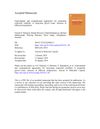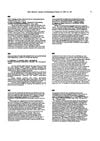 February 2025 in “PubMed”
February 2025 in “PubMed” Alopecia areata cases have increased globally, affecting mostly women aged 30-34, with links to other health issues.
 January 2025 in “International Journal of Nanomedicine”
January 2025 in “International Journal of Nanomedicine” Rosemary-based gel with metformin may effectively treat hair loss like minoxidil.
 April 2024 in “AAPS PharmSciTech”
April 2024 in “AAPS PharmSciTech” New microneedle method improves hair regrowth treatment delivery.
 January 2024 in “Journal of Pharmacognosy and Phytochemistry”
January 2024 in “Journal of Pharmacognosy and Phytochemistry” Rosemary hair serum promotes healthier, stronger, and shinier hair.
 November 2023 in “Journal of Cosmetic Dermatology”
November 2023 in “Journal of Cosmetic Dermatology” People with non-scarring hair loss often have lower vitamin D levels than those without hair loss.
 1 citations
,
June 2023 in “Journal of Dermatology”
1 citations
,
June 2023 in “Journal of Dermatology” People with Alopecia Areata are more likely to have autoimmune diseases, inflammatory diseases, and mental health issues like anxiety and depression.
 11 citations
,
July 2022 in “Frontiers in immunology”
11 citations
,
July 2022 in “Frontiers in immunology” Cases of alopecia areata and its impact on life quality rose globally, but when adjusted for age, the rates decreased, especially in poorer regions.
 14 citations
,
May 2022 in “Asian Journal of Pharmaceutical Sciences”
14 citations
,
May 2022 in “Asian Journal of Pharmaceutical Sciences” New hair follicle-targeting treatments show promise for hair disorders but need more research on safety and effectiveness.
5 citations
,
April 2022 in “Pharmaceutics” Minoxidil nanoparticles significantly boost hair growth in mice compared to regular minoxidil.
7 citations
,
December 2021 in “Pharmaceutics” The nanoemulsion with garlic oil, apple cider vinegar, and minoxidil could effectively treat alopecia areata.
 12 citations
,
July 2021 in “Scientific Reports”
12 citations
,
July 2021 in “Scientific Reports” Glutamic acid helps increase hair growth in mice.
 16 citations
,
June 2021 in “Journal of Dermatological Treatment”
16 citations
,
June 2021 in “Journal of Dermatological Treatment” Minoxidil effectively treats hair loss, especially androgenetic alopecia, but needs more research for better understanding.
 2 citations
,
April 2021 in “International Journal of Pharmaceutics”
2 citations
,
April 2021 in “International Journal of Pharmaceutics” Serum formulations were better at delivering molecules to the hair bulb than nanoparticles.
23 citations
,
March 2021 in “Gels” Microemulsions can improve minoxidil delivery and effectiveness for hair loss treatment.
 47 citations
,
December 2020 in “Journal of the European Academy of Dermatology and Venereology”
47 citations
,
December 2020 in “Journal of the European Academy of Dermatology and Venereology” The document concludes that understanding and treating hair loss requires recognizing its various types and using appropriate diagnostic tools and treatments.
 26 citations
,
February 2020 in “International Journal of Biological Macromolecules”
26 citations
,
February 2020 in “International Journal of Biological Macromolecules” Chitosan-coated dutasteride nanocapsules improve hair treatment, and physical stimulation boosts effectiveness.
 26 citations
,
April 2019 in “Journal of Cosmetic Dermatology”
26 citations
,
April 2019 in “Journal of Cosmetic Dermatology” Herbal alternatives like saw palmetto and green tea may offer safe, effective treatment for hormonal hair loss.
 7 citations
,
February 2019 in “Journal of Molecular Liquids”
7 citations
,
February 2019 in “Journal of Molecular Liquids” Minoxidil dissolves better in propylene glycol and water as temperature and propylene glycol amount increase.
 40 citations
,
January 2018 in “Pharmaceutics”
40 citations
,
January 2018 in “Pharmaceutics” Eucalyptol and oleic acid in nanoemulsions improve minoxidil delivery to hair follicles, potentially enhancing hair loss treatment.
 35 citations
,
January 2018 in “Skin pharmacology and physiology”
35 citations
,
January 2018 in “Skin pharmacology and physiology” Nanoemulsion creams with certain enhancers can greatly increase caffeine delivery through skin.
 128 citations
,
March 2016 in “Advanced Pharmaceutical Bulletin”
128 citations
,
March 2016 in “Advanced Pharmaceutical Bulletin” Smaller nanoparticles penetrate skin better, especially through hair follicles.
244 citations
,
January 2010 in “Journal of the American Academy of Dermatology” The document says current treatments for alopecia areata do not cure or prevent it, and it's hard to judge their effectiveness due to spontaneous remission and lack of studies.
 212 citations
,
September 2008 in “Journal of The American Academy of Dermatology”
212 citations
,
September 2008 in “Journal of The American Academy of Dermatology” Minoxidil and finasteride treat hair loss in men, while minoxidil treats hair loss in women.























